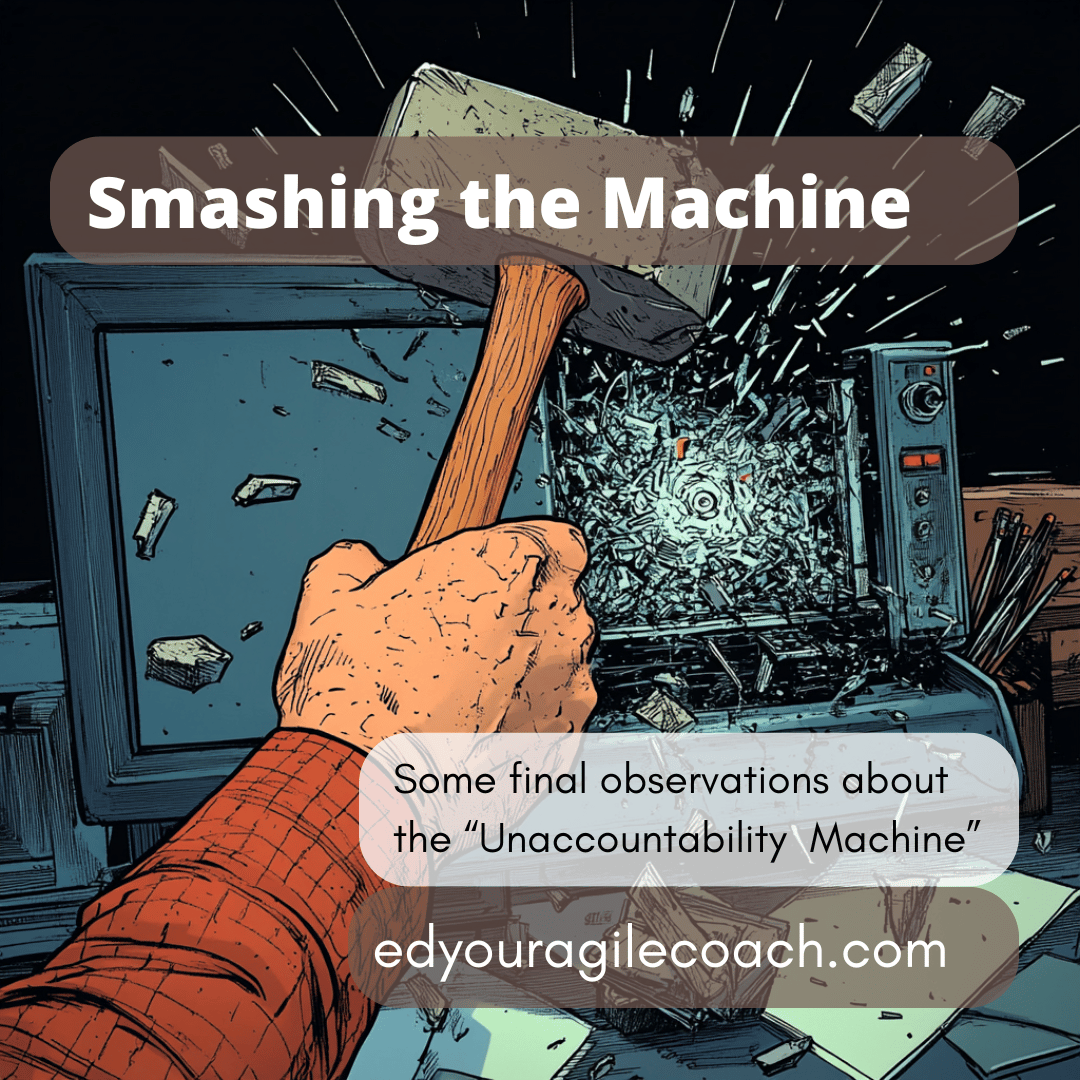Smashing the Unaccountability Machine.

Dan Davies outlines the most credible explanation for our current political and cultural moment in his book "The Unaccountability Machine." The complicated systems that govern our lives are becoming increasingly unresponsive to feedback, making us angry. I dedicated several blog posts to this topic, and today, I want to wrap up with what Davies calls his final diagnosis and possible solution to The Unaccountability Machine.
According to Davies, business has become larger and more complicated since the end of World War Two. Managing a typical corporation requires thousands of people with tremendous training and dedication. It is so complex that the network engineers who keep the email working cannot fathom the decisions made by the tax accountants who authorize their equipment purchases. Those of us working at large organizations feel tossed around like a sailboat caught in a storm. Decisions and environmental conditions do not make sense because we do not understand the complex cause-and-effect chain that leads to those decisions.
Here is where Davies comes up with his famous maxim about accountability.
"The extent to which you are able to change a decision is precisely the extent to which you can be accountable for it, and vice versa."
We should be able to hold people accountable when things go wrong and reward them when they go well. Since the great recession of 2008, many people suspect that people are reaping the benefits of success while avoiding the accountability of failure. Two weeks ago, I pointed out that our reliance on economics and its advanced mathematics to understand the world around us has created tremendous blind spots in how we see the world. These blind spots are so big that politicians and business leaders often do not realize they are missing something. Next, economists engage in something called the Recardian Vice, which makes their profession look scientific but is more of an educated guess. So modern economics provides a helpful shortcut to making business and policy decisions, but it often has significant blindness, which ignores the variation in human behavior.
Last week, I explained how Davies describes Stafford Beer's ideas about cybernetics for large systems. Each large organization operates five systems, from System-1, where people interact with the external world daily, to System-5, where people define the organization's ideology and purpose. These five systems operate recursively from the most minor level to a global perspective spanning nations. The stage is now set for our current predicament because accountability is in short supply thanks to economics and our misunderstandings of how systems work.
Last week, I pointed out that according to Beer, Systems-3 people behave like traditional managers when helping organizations achieve their strategic and tactical goals. System-3 people are very concerned with the here-and-now problems of the organization. To counterbalance that, System-4 people are specialists and experts concerned with their-and-then issues and coming up with possible contingencies for future problems. System-5 people were supposed to step in and provide a vision and purpose to guide the organization to avoid conflict. The firm can respond to change and deliver sustainable operations if everything works correctly. Currently, that is not happening, and people are getting angry.
The problem has simmered in American business and politics from the 1950s to the early 1970s. The rise of youth culture, the expansion of civil rights, and the increasing power of labor unions created an existential problem for businesses. Problems that baffled business owners and managers alike: how was someone supposed to operate a business when you have hippies, feminists, members of the John Birch Society, and all of these formerly disadvantaged groups demanding increased representation?
The answer came from an economist from the University of Chicago named Milton Friedman and his essay "A Friedman Doctrine: The Social Responsibility of a Business is to Increase its Profits." In the essay, Friedman argued that if a business focuses on anything, it should be to generate profits for its shareholders. If managers behave in any other fashion, they act like governments instead of corporations. In three thousand words, the entire System-5 business world had a unifying mission. Everything else would be subordinate to increasing profit and boosting the value of the shareholders' business.
Now, every decision business people make has a simple answer. If you have two competing priorities for an issue, you always choose the one that maximizes profit for the business owners. A simple doctrine supplanted the complex work of business managers and owners, elevating profit maximization to the ultimate good. When pressed on their decisions, they cited profit maximization, thus evading accountability by saying they had no choice.
The excuse works in many cases, but increasingly, it is wearing thin as communities are suffering from a lack of investment, the spread of drug addiction created by hopelessness, and increasing environmental damage. Profit maximization does not care about these issues; it only focuses on how to get the most money for every person and business on the planet. It was a mindset that made plenty of System-5 people plenty of money. It also increased the gulf of inequality between the people owning businesses and the System-3 and System-4 people who kept them operating. It also generated mutual resentment between these three groups.

Since it is easier to cut costs than grow revenue or innovate, System-5 people, using the methods of economics with its glaring blind spots, began slashing the global workforce. The great flattening of business has been going on for over fifty years, with organizations striving to be leaner and more efficient. It has significantly reduced the number of System-3 and System-4 people who need to react to actual-world conditions. As Davies says:
"Rather than thinking about actual human beings working in an association, we're invited to replace them with a black box that only cares about profits, then pretend that we can enter into the same sorts of relationships with that black box as we could with the individuals. "
Plenty of System-3 and System-4 people lost their jobs. It broke the lines of communication that were supposed to operate in organizations, and the System-3 and System-4 people left behind created additional accountability sinks to avoid being held responsible when things needed to change. The risk and responsibility for the organization were borne by the people least likely to cope with the environmental changes: the System-1 and System-2 people.
People can endure plenty of hardship and difficulty until it gets overwhelming. Fraud and corruption, born from Friedman's profit maximization ethos, caused the 2008 economic collapse. When we understood the scale of the damage, no one was held accountable because of the accountability sinks the banking industry had constructed. All the government could do was print money and hope that conditions would improve. In the meantime, plenty of people lost their homes, and the people who created the mess escaped, never to do business again, but with enough money never to worry about the future.
It made people angry, and when they attempted to voice their anger, there were not enough System-3 and System-4 people in business to communicate the warning signals. Government change-makers faced constant vetoes from those who defended the existing system, worsening the situation. It was a perfect breeding ground for people calling for simpler times when things were less complicated; when manufacturing dominated the economy, women and underrepresented people knew their place, and pollution was necessary for economic development. Davies blames the political earthquakes of MAGA and Brexit on the desire to do something about the increase in inequality within our developed society and our business world.
In a healthy society with responsive elected officials and business leaders, someone would do something to address this anger. Instead, we see elite members of society shrugging their shoulders, saying they cannot do anything, or openly flaunting their perks and privileges. The anger continues to rise.
Davies suggests some ideas. First, he thinks we should be more skeptical of economists and their opinions about political and business decisions. Also, the desire to maximize profits at all costs has created perverse incentives out of our business ventures, leading to destructive outcomes. Davies says:
"Any system set up to maximize a single objective has the potential to go bonkers."
When that happens, it is the responsibility of government and business leaders to step in and provide order and reform. Unfortunately, the United States and the United Kingdom have conservative parties fully embracing profit maximization. At the same time, liberal parties are frightened that if they upset the system too much, they will face permanent electoral exile. It is a glum set of circumstances, but Davies says we can only escape our current circumstances when:
"Every decision-making system set up as a maximizer must have a higher-level system watching over it."
In the aftermath of Enron and the Great Recession of 2008, the government did the difficult things and passed the Sarbanes-Oxley Act to ensure banks were not creating financial instruments designed to explode. It also ensured that people would go to jail if corporate financial statements were fraudulent. Reinstating the Glass-Steagall Act would also eliminate the perverse incentive of banks as both banks and investment houses. Finally, I like some ideas from Senator Elizabeth Warren, who wants to change the tax laws around private equity firms so they would be responsible for the debt they ring up on acquisitions. Jo Ann Fabrics and Toys ' R ' Us would still be in business if those rules were in effect.
Davies points out that our political and business culture took over fifty years to construct the Unaccountability Machine. It will take at least twenty-five years to undo the damage of that system. I have about twelve years left in my career, so that I will do my part. Still, I will also have to ask the next generation to take on this effort if we hope to have a business community that is sane, satisfying, and sustainable.
Until next time.




Comments ()